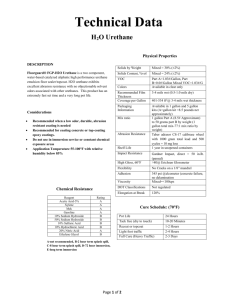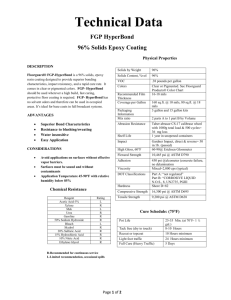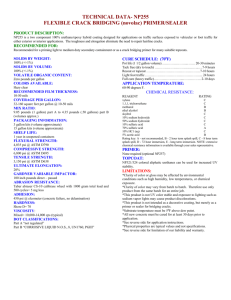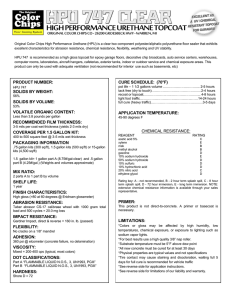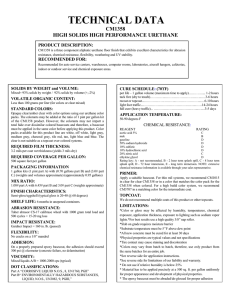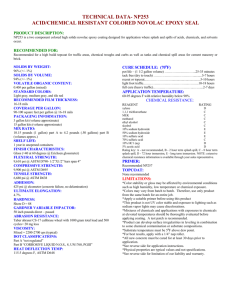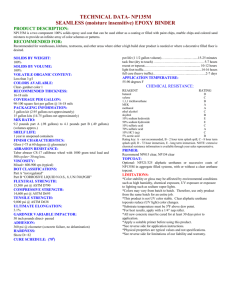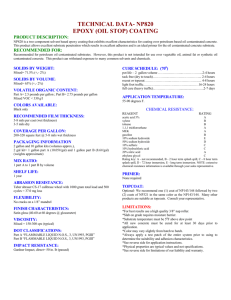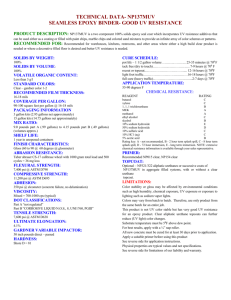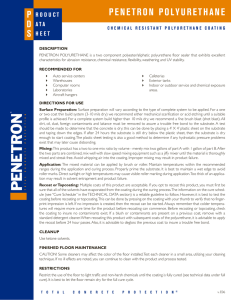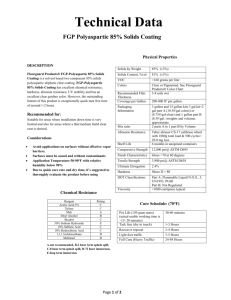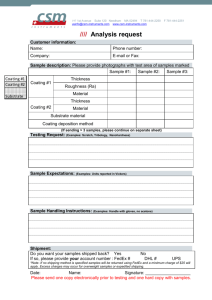HyperRez UV Technical Data
advertisement
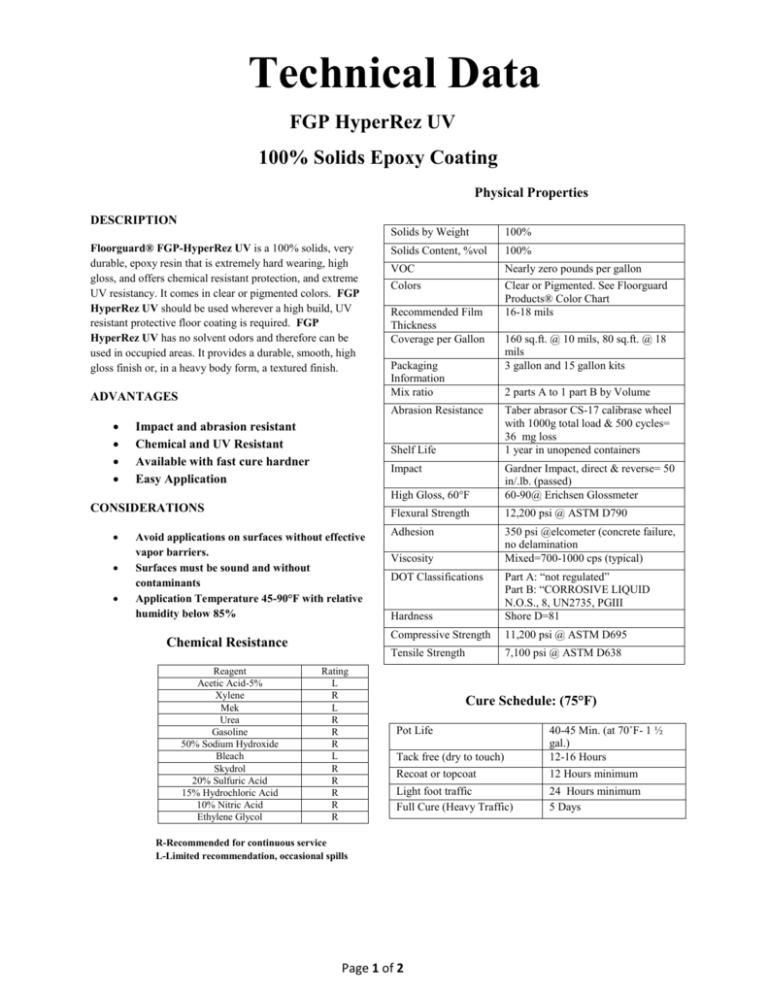
Technical Data FGP HyperRez UV 100% Solids Epoxy Coating Physical Properties DESCRIPTION Floorguard® FGP-HyperRez UV is a 100% solids, very durable, epoxy resin that is extremely hard wearing, high gloss, and offers chemical resistant protection, and extreme UV resistancy. It comes in clear or pigmented colors. FGP HyperRez UV should be used wherever a high build, UV resistant protective floor coating is required. FGP HyperRez UV has no solvent odors and therefore can be used in occupied areas. It provides a durable, smooth, high gloss finish or, in a heavy body form, a textured finish. ADVANTAGES Solids by Weight 100% Solids Content, %vol 100% VOC Nearly zero pounds per gallon Colors Clear or Pigmented. See Floorguard Products® Color Chart 16-18 mils Recommended Film Thickness Coverage per Gallon Packaging Information Mix ratio 2 parts A to 1 part B by Volume Abrasion Resistance Impact and abrasion resistant Chemical and UV Resistant Available with fast cure hardner Easy Application Shelf Life Impact CONSIDERATIONS Avoid applications on surfaces without effective vapor barriers. Surfaces must be sound and without contaminants Application Temperature 45-90°F with relative humidity below 85% Chemical Resistance Reagent Acetic Acid-5% Xylene Mek Urea Gasoline 50% Sodium Hydroxide Bleach Skydrol 20% Sulfuric Acid 15% Hydrochloric Acid 10% Nitric Acid Ethylene Glycol Rating L R L R R R L R R R R R 160 sq.ft. @ 10 mils, 80 sq.ft. @ 18 mils 3 gallon and 15 gallon kits Taber abrasor CS-17 calibrase wheel with 1000g total load & 500 cycles= 36 mg loss 1 year in unopened containers High Gloss, 60°F Gardner Impact, direct & reverse= 50 in/.lb. (passed) 60-90@ Erichsen Glossmeter Flexural Strength 12,200 psi @ ASTM D790 Adhesion 350 psi @elcometer (concrete failure, no delamination Mixed=700-1000 cps (typical) Viscosity Hardness Part A: “not regulated” Part B: “CORROSIVE LIQUID N.O.S., 8, UN2735, PGIII Shore D=81 Compressive Strength 11,200 psi @ ASTM D695 Tensile Strength 7,100 psi @ ASTM D638 DOT Classifications Cure Schedule: (75°F) Tack free (dry to touch) 40-45 Min. (at 70˚F- 1 ½ gal.) 12-16 Hours Recoat or topcoat 12 Hours minimum Light foot traffic Full Cure (Heavy Traffic) 24 Hours minimum 5 Days Pot Life R-Recommended for continuous service L-Limited recommendation, occasional spills Page 1 of 2 Limitations Colors or gloss may be affected by high humidity, low temperatures, chemical exposure, or exposure to lighting such as sodium vapor lights. For best results use a 3/4” nap roller Slab on grade requires moisture barrier Substrate temperature must be 5°F above dew point All new concrete must be cured for at least 30 days Physical properties are typical values and not specifications Tire contact may cause staining or discoloration (long term parked vehicles) Colors may vary from batch to batch, therefore use only product from the same batch for an entire job. MIXING AND APPLICATION INSTRUCTIONS SUBSTRATE PREPARATION: Preparation methods may vary depending on the system being applied. For a complete system thickness that is higher than 10 mils dry, a fine brush blast (shot blast), is recommended. To assure a trouble free bond, all dust, oil, dirt, foreign contaminants and laitance must be removed. It is recommended to perform a moisture test to determine that the concrete has an appropriate vapor barrier. This can be done by placing a 4’X4’ plastic sheet on the substrate and taping down the edges. Once 24 hours has passed, and the substrate is still dry below the plastic sheet, then the substrate does not show signs of eventual hydrostatic pressure problems that may later cause disbonding. This test does not guarantee, however, that there may not be future hydrostatic pressure issues in the future. PRODUCT STORAGE: Product must be stored in an area that will bring the product to room temperature prior to using. Continuous storage should be between 60 and 90 degree F. Keep from freezing PRODUCT MIXING: This product has a two to one mix ratio by volume-merely mix 2 gallons of part A with 1 gallon of part B. After the two parts are combined, mix well with slow speed mixing equipment until the material is thoroughly mixed and streak free. Avoid whipping air into the coating. Improper mixing may result in product failure. When pigmenting the product, add the desired amount of pigment into the mixing bucket first, then add the part A, then add the part B, and mix until thoroughly blended and streak free. Product Application: Properly prime the substrate prior to applying this product. Use a brush or roller to apply the mixed material. This product can be applied using a knotched, or serrated squeegee, then back rolled to maintain appropriate thickness. Maintain temperatures within the recommended ranges during the application and curing process. It is best to maintain a wet edge to avoid roller marks. Direct sunlight or high temperatures may cause visible roller making during application. Applying the product too thick may result in solvent entrapment and product failure. Recoat or Topcoating: Installing multiple coats of this product is acceptable. If recoating this product, be sure that all of the solvents have evaporated from the coating during the curing process. Refer to the cure schedule as a guideline to follow, however it is best to test the coating before recoating or topcoating. This is done by pressing your thumb on the coating to ensure a fingerprint impression is not visible. If there is no impression visible, then coating the floor can be done. Note, colder temperatures require longer cure times before product can be recoated. Prior to coating the floor, make sure there are no contaminants exist. If contaminants or a blush exists, remove with a standard detergent cleaner and ensure floor is clean and dry prior to coating. When recoating this product with subsequent coats of urethane, make sure to apply the recoat within the 24 hour time frame. It is recommended to degloss the previous floor prior to coating to ensure a trouble free bond. Cleanup, Floor Cleaning and Restrictions : Use solvents for cleanup. When cleaning the floor, CAUTION! Some cleaners may affect the color of the installed floor. Test each cleaner used in a small area, ensuring no damage occurs. Restrict the use of the floor to light traffic and non-harsh chemicals until the floor is fully cured, refer to the cure schedule. Allow the floor to remain completely dry during the curing process. Warranty Floorguard Products® warrants that our products are manufactured to strict quality assurance specifications and that the information supplied by us is accurate to the best of our knowledge. Such information supplied about our products is not a representation or a warranty. It is supplied on the condition that you shall make your own tests to determine suitability of our product for your particular purpose. Listed physical properties are typical and should not be construed as specifications. NO WARRANTY IS MADE, EXPRESSED OR IMPLIED, REGARDING SUCH OTHER IFNORMATION, THE DATA ON WHICH IT IS BASED, OR THE RESULTS YOU WILL OBTAIN FROM ITS USE. NO WARRANTY IS MADE, EXPRESSED OR IMPLIED, THAT OUR PRODUCT SHALL BE MERCHANTABLE OR THAT OUR PRODUCT SHALL BE FIT FOR ANY PARTICULAR PURPOSE. NO WARRANTY IS MADE THAT THE USE OF SUCH INFORMATION OR OUR PRODUCT WILL NOT INFRINGE UPON ANY PATENT. We shall have no liability for incidental or consequential damages, direct or indirect. Our liability is limited to the net selling price of our product or the replacement of our product, at our option. Acceptance of delivery of our product means that you have accepted the terms of this warranty whether or not purchase orders or other documents state terms that vary from this warranty. No representative is authorized to make any representation or warranty or assume any other liability on our behalf with any sale of our products. Our products contain chemicals that may CAUSE SERIOUS PHYSICAL INJURY. BEFORE USING, READ THE MATERIAL SAFETY DATA SHEET AND FOLLOW ALL PRECAUTIONS TO PREVENT BODILY HARM. Page 2 of 2
